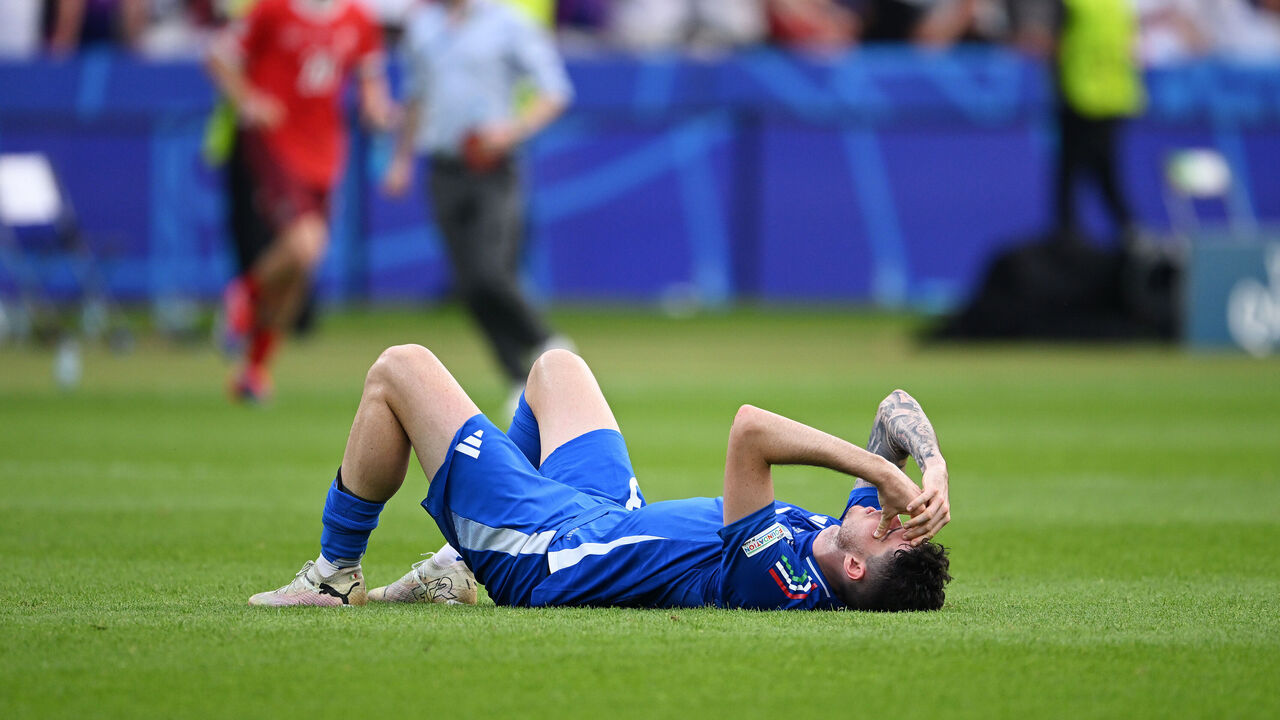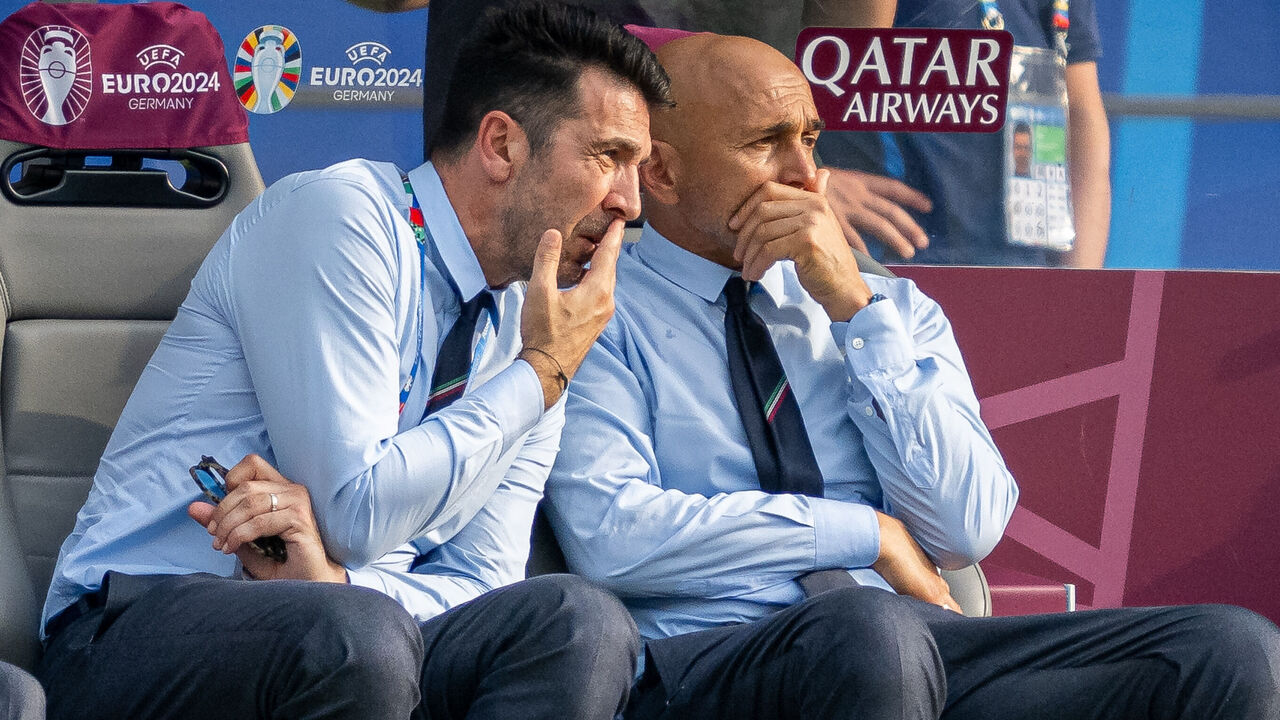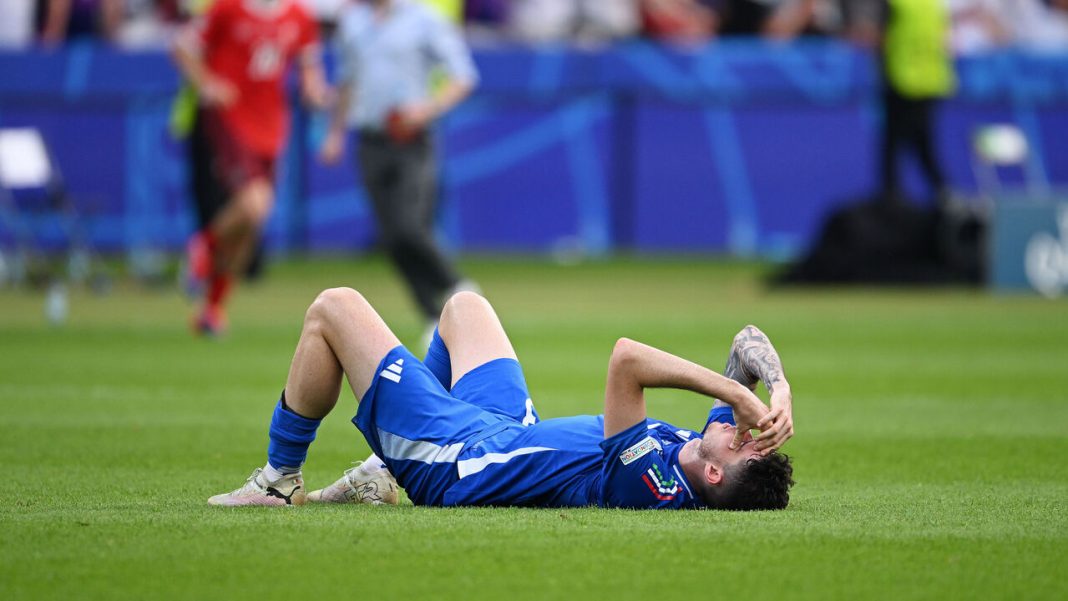[ad_1]
You could see the confusion on the pitch. When the Italians thought they were playing the right ball, no one was even in remote proximity to receive it. They gestured as they looked for an outlet and urged each other to move into space. Before Switzerland’s first goal in Saturday’s round of 16 match at Euro 2024, defenders Giovanni Di Lorenzo and Alessandro Bastoni pointed to their right at the same time, imploring the other to track a potential run down the flank. The mix-up allowed Ruben Vargas to tee up the opener.
The second half changed nothing. Another giveaway, just seconds after play resumed, and that was it. A 2-0 loss at the Olympiastadion in Berlin – where Italy won the 2006 World Cup – ended the Azzurri’s title defense as meekly as it began.
No number of international embarrassments seems to shake the Italian national team out of its stasis. There’s no explaining how a team can go from winning the Euros in 2021 to missing the World Cup less than a year later, to then showing up for a knockout match without a clue. This is Italy’s story, though. After producing emotional victories – the shootout win over France in the 2006 World Cup final, beating England at Wembley Stadium at Euro 2020 – it comes crashing down with heavy force. Even at this tournament, what followed after Mattia Zaccagni’s spellbinding 98th-minute equalizer against Croatia – the goal that sent Italy through to the knockout phase – was utterly deflating.

Italy failed to qualify for each of the last two World Cups, but a lack of talent isn’t the issue. There are good players here and many more coming through. Bastoni, Alessandro Buongiorno, and Riccardo Calafiori are mobile center-backs with great awareness, and Giorgio Scalvini, who ruptured his ACL before the tournament, is a throwback with excellent heading ability. Destiny Udogie, ruled out with his own injury, is a promising left-back who can fly up the flank and dribble past opponents. Nicolo Barella eats up the pitch when healthy, as does Sandro Tonali, who’s serving out the last few weeks of his betting ban. Gianluca Scamacca is a Europa League winner who recently scored twice at Anfield. That says nothing of the players coach Luciano Spalletti cut from his roster, including ball-playing midfielder Manuel Locatelli and Serie A’s highest-scoring winger, Riccardo Orsolini. Francesco Camarda, the 16-year-old striker who recently helped Italy win the U17 Euro title, will arrive on the scene soon, too.
Italy faced the same reckoning in 2018 when it missed the World Cup thanks to then-coach Gian Piero Ventura’s inexplicably negative tactics. Lorenzo Insigne, then one of the country’s most electrifying wingers, sat alone on a cooler as an unused substitute in that qualifying playoff defeat to Sweden. The pieces were there. The team just needed someone to put them together. Roberto Mancini came in and did exactly that, leading Italy to Euro 2020 glory.
But then it fell apart again in World Cup qualifying, again in a playoff against North Macedonia, and it nearly reached a new low as Italy struggled to qualify for these Euros. A goalless draw against Ukraine clinched a berth that could’ve easily slipped through the cracks.
Italy continued to do the bare minimum in Germany. It allowed the quickest-ever goal in tournament history after just 23 seconds in its opener against Albania and conceded first in its other three matches. Spalletti’s side entered every game scared, looking less like the defending champion and more like a tournament debutant. Spalletti imposed various systems and chopped and changed his lineup, and then blamed his players for being too timid. You can’t ask a turtle to win a sprint, but that didn’t stop Spalletti from trying.

“This is part of a process,” Spalletti said after Saturday’s defeat. “All of the other coaches had 20 matches in charge before they had this Euro; I only had 10 and we were always under fire – ‘you have to win, you have to win.’ I probably need to get to know my team a bit better to be able to set things up better. We also had a number of players who had injuries who I was counting on.”
This is what Italian coaching has become: one big philosophy lesson. Spalletti made no attempt to keep things simple in a setting as unforgiving and time-sensitive as tournament football. It was the players’ fault they couldn’t adapt, he claimed, and their fault for not showing enough physicality or personality. Spalletti blamed injuries and absences and inexperience, but not the system he imposed that clearly held these players back.
There were countless mistakes. Bastoni and Gianluca Mancini, filling in for the suspended Calafiori, didn’t know how high to keep their defensive line. Bryan Cristante, Italy’s slowest midfielder, and Barella, clearly nursing an injury, played higher up the field than they’re used to playing, and left a yawning chasm in midfield that Switzerland was all too happy to exploit. Scamacca had an army on him whenever he received the ball, but little support from his teammates, who seemed unsure of where they were supposed to be.
“We tried a few things at these finals, but I come away with the notion that I have to change things,” Spalletti added. “It’s not as scandalous a result as people will make out. We made it through a tough group. But we didn’t see a team with a personality in terms of fundamentals. And that’s what we have learned from this experience at Euro 2024.”
The problem is that Italy has been here before. It has learned nothing from the past. Spalletti’s comments suggest there were no valuable lessons taken from this abysmal title defense, either.
[ad_2]
Source link
